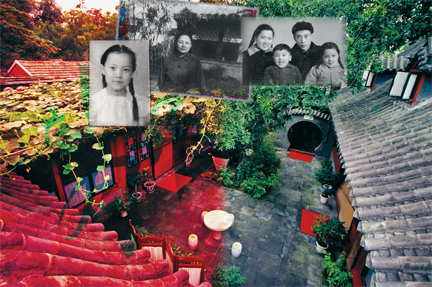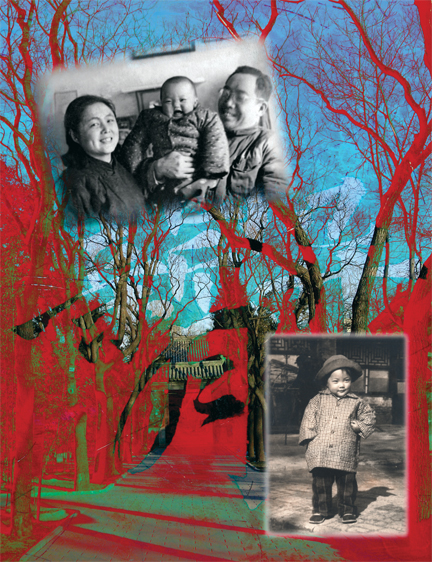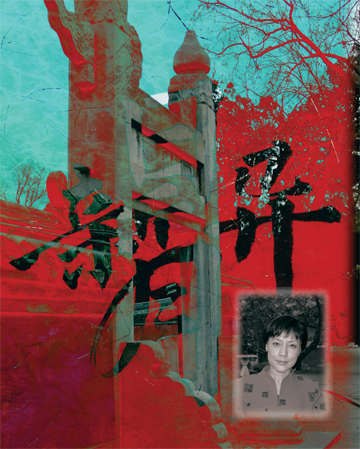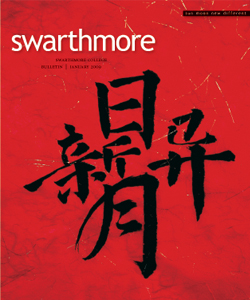A Song of Memories
A nostalgic journey through childhood during China’s Cultural Revolution
In her memoir Snow Falling in Spring: Coming of Age in China During the Cultural Revolution (Farrar, Straus and Giroux, 2008), Moying Li, now vice president and senior analyst at a Boston-based investment management company, offers a vivid and moving portrayal of her life from summer 1958 up to the day she left her homeland on the journey that brought her to Swarthmore College. She was one of the first students to leave China since 1949.
This is where her story began:
PROLOGUE
It took me over 20 years to return to my grandma Lao Lao’s old courtyard in Beijing, where I spent much of my short childhood. I was shocked to find it gone. Bulldozed. Wiped from the face of the earth. It was like discovering that a dear friend had died and realizing I had been robbed of the last chance to say goodbye.
I sat on a pile of shattered gray bricks—the only remnants of my grandpa Lao Ye’s labor—watching the brisk November wind lift the withered leaves from the dusty ground, up and up and away from me.
Then I closed my eyes—to remember.
THE GREAT LEAP
It was a hot summer, and the words on every grownup’s lips were great leap forward. “In fifteen years,” someone said, bubbling with excitement, “China will overtake Britain!” Then, Baba (Father) spun the wooden globe next to his desk and pointed out to me where Britain was. Touching the spot with my fingertip, I murmured, “But it’s so small.” I could not understand why Baba and his friends were eager for China, a large splash of green on Baba’s globe, to surpass another country that was only a gray speck—smaller than some Chinese provinces. But the glow of hope on their faces and the confidence in their voices told me that this Great Leap Forward would be a big accomplishment—something to be truly proud of. I trusted grownups in those days with all my heart. This was the summer of 1958, and I was 4 years old.
My family lived in Beijing with my maternal grandmother, Lao Lao, and maternal grandfather, Lao Ye, in a traditional siheyuan—a large square yard surrounded by one-story houses with sloping roofs on each side. Sharing our siheyuan were my aunts and uncles and a few tenants—the families of a tailor, an electrician, and a clerk.
Decades before I was born, it was Lao Ye who carefully lined our roofs with smooth gray tiles and installed large windows along the brick walls. Above the glass windows were wooden zhichuang (shutters), which could be propped up by thin sticks to let in fresh air. When thunder and lightning raged outside, I would huddle with Lao Lao and watch it through the windowpanes as she pampered me with sweet tea and cookies. Inside, I felt safe and cozy.
The garden in our courtyard was my favorite place, with flowers taking turns to blossom even into late fall. Our golden daffodils—or water fairies, as Lao Lao called them—proudly announced the coming of spring. In the summer, pale jasmine opened up at night, filling our siheyuan with its fragrance. Lao Lao encouraged the jasmine’s nimble vines to climb freely up and around our bamboo fence, forming a blooming wall that separated the garden from the rest of the yard. Hardy chrysanthemums—in pink, yellow, and white—flowered from season to season. It was in this garden, I was told, that I took my first steps, surrounded by aunts and uncles, their arms reaching out to catch me if I fell.
Next to the jasmine wall was a tall huaishu (scholar tree). During the summer months, the sweet scent from its delicate flowers filled our yard, while the droning songs of cicadas, sheltered among its abundant leaves, lulled me to sleep. Under the huaishu’s cooling shade, Lao Lao set up a permanent place for two of my favorite things—a little red wooden table and a small red armchair—gifts from my future uncle-in-law, who had lavished his craftsman’s talent on me in a skillful pursuit of my doting aunt.
During the day, the garden became the center of our family activities, a place where the women sewed and washed, while the men chatted. For my brother, Di Di, and me, the large open yard next to the garden was both playground and battlefield. There, we shared our new tricycle with our neighbors’ children, taking turns racing from one end of the yard to the other. Even though Di Di was a year younger than I, he was faster on the tricycle.
With our friend Ming, the tailor’s youngest son, hanging on to the rear rack, Di Di would pedal past every door in our courtyard, waving to anyone who cared to look. Sometimes, the two of them would charge straight at me and the other girls until we screamed and scattered. In this big yard, grownups watched us from every window, but we felt totally free.
After a family dinner spread on a large square table, spiced by my uncles’ jokes and my aunties’ laughter, each family unit would retreat to its separate rooms. For me, however, there were no boundaries as I happily darted in and out of my parents’ and grandparents’ houses. Family was just family, I believed, without doors or walls. And as the first grandchild, I felt entitled to all of their hearts as well as their space.
Our farm animals were almost as free, housed in a shed under a giant elm in a corner of the courtyard. To me, the shed was like a small zoo. Two white rabbits with big red eyes lived there, as well as a rooster with glistening golden feathers, and four chickens—two white and two brown. Lao Lao had handpicked each animal from street vendors. The rabbits were my favorites, so warm and soft to the touch. Sometimes I even lured them into my bedroom with a carrot so that I could cuddle them.
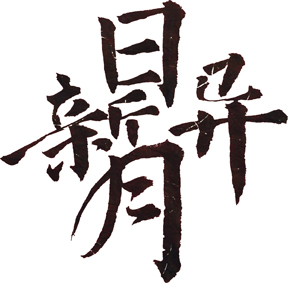 Early that summer when I was 4, Baba took Di Di and me to visit his youngest sister, who lived by the sea. When we returned in the fall, I could hardly believe my eyes—our courtyard was strewn with bricks, holes, and scrap metal! An ugly brick furnace, almost as tall as Baba, stood right in the center. I was in shock.
Early that summer when I was 4, Baba took Di Di and me to visit his youngest sister, who lived by the sea. When we returned in the fall, I could hardly believe my eyes—our courtyard was strewn with bricks, holes, and scrap metal! An ugly brick furnace, almost as tall as Baba, stood right in the center. I was in shock.
“This is to make iron and steel for the Great Leap Forward,” Baba said, “Our country needs strong construction materials.”
That Great Leap again, I thought, remembering Baba’s globe with its colorful dots and splashes. I stepped gingerly around my shattered yard, dodging the busy grownups who, shovels in hand, were too preoccupied to pay me the usual attention. Even Lao Lao joined their efforts. “Isn’t it wonderful?” She beamed, holding me up in her arms. “We are helping our country.”
“Yes, I know. We are going to catch up with that small dot before I grow up,” I grumbled. Looking at what this Great Leap had done to my playground, I found it hard to share their excitement.
Soon my freedom, together with that of our rabbits and rooster, was restricted. Under Lao Lao’s order, we were to stay in the garden behind the bamboo fence. Outside the fence, the world was pouring into our yard, day and night. Excited neighbors, scores of them, brought in firewood by the cartload and piled it up next to the furnace, ample fuel for the fire that crackled and roared. Some of the wood had been freshly split from old benches and chairs, with peeling paint and pointy nails still sticking out. The furnace, my enemy number one, was built with layers and layers of red bricks. On top of them sat a shiny metal hat with spurts of smoke, sometimes even red sparks, bursting out from under it. Fascinated but scared, I stared at the burning furnace, hugging my favorite rabbit for comfort.
None of this seemed to bother the grownups. They filed into our courtyard with their metal pots and pans—anything they could find and everything they could spare—to be melted into steel. People did not have much in those days, but the odds and ends soon looked like a small mountain next to the woodpile. As I watched, the tailor’s wife stepped out of her house with a frying pan. She hesitated, flipping the pan in her hands and wiping it again and again with her handkerchief. She seemed to be saying goodbye to an old friend.
Slowly, she walked up to the metal pile and gently laid her frying pan, now gleaming in the sun, on top of the little mountain. She stared at it for a few moments, then suddenly turned and walked away, never looking back.
Da Jiu (oldest maternal uncle), a math professor home on sick leave, was in charge of quality control. Stooping down from his slender height, he inspected the pile, separating the usable pieces from the junk. Picking up a wok cover, he examined it, tapped on it lightly, and then tossed it onto a smaller pile of rejects. He nodded at the mountain of metal that was growing larger by the hour.
My favorite neighbor, Uncle Liu, the electrician, tall and broad-shouldered, stood by the furnace like a warrior, shoveling logs and broken chairs into its mouth. Gripping a long steel pole with both hands, he used its tip to hook open the hinges of the furnace door. He prodded the burning wood and then slapped the door shut when the wood started to crackle. It looked to me as if he was feeding a roaring dragon. The clerk, short and dark but equally solemn, used a large iron ladle to channel the red burning liquid into a mold, while our third neighbor, his face glowing from the heat of the flames, inspected the fruit of their labors with a tailor’s precision.
Standing at a safe distance, I became transfixed by the scene in front of me and forgot about my fear and my destroyed playground. Then, an idea hit me. I bolted into Lao Lao’s kitchen, threw open her large cabinet doors, and crawled on hands and knees in search of family treasure. I spotted a big water ladle at one corner of the cabinet and some spoons in a drawer, and threw them all into a bamboo basket next to the stove. I grabbed a large kettle and dropped it into the basket as well. Before darting outside, I surveyed the kitchen one last time and then threw Lao Lao’s heavy cleaver on top of my prizes. Dragging the basket behind me, I hurried as fast as my feet and the load would allow and dumped everything, basket and all, onto the mound of metal carefully selected by Da Jiu. Thank goodness I had been watching closely and knew which pile was the chosen one!
I crept back behind the bamboo fence and slumped down in my little red chair, tired but satisfied. Throughout the day I sat there, spellbound. I shared every sign of triumph—the electrician patting the clerk’s shoulder, the clerk shaking the tailor’s hand, and then all of them giving a thumbs-up to Da Jiu. As the sun slowly set, leaving a trail of purple clouds in the crisp autumn sky, Da Jiu pushed his black-rimmed eyeglasses up and beamed.
Suddenly I heard Lao Lao’s voice. She had just returned home, ready to tackle dinner. “‘Where is my kettle” she asked, walking over to where I was sitting. “Have you seen my cleaver?”
“Yes, I helped our country with it,” I replied proudly, without removing my eyes from the furnace. “Maybe they are burning it now.”
Lao Lao rushed over to Da Jiu and his metal pile. Together, they found the kettle and some spoons, but not the big cleaver. The knife had joined its comrades in the burning fire, doing its share for China.
My escapade circulated around the dinner table that night. Choking from chewing and laughing at the same time, Baba turned to me and said, “It’s good that you want to help, but next time it would be good to check with Lao Lao first.”
 Our roaring furnace popped and burned day and night for months. Every morning at dawn, our courtyard came alive with clatter and chattering. Then one morning I woke up to silence. Something was different. I ran outside to see.
Our roaring furnace popped and burned day and night for months. Every morning at dawn, our courtyard came alive with clatter and chattering. Then one morning I woke up to silence. Something was different. I ran outside to see.
In our courtyard, Da Jiu and our neighbors sat on the woodpile, their heads bowed like those of defeated soldiers. The fire in the furnace had died, leaving a lingering smell of burnt wood.
“What happened, Da Jiu?”
“The iron and steel we made was not good enough.” He sighed. I stared at him in disbelief. “We simply did not know enough to make it right,” he added.
Now I was sad, too. Climbing up the woodpile to sit next to him, I leaned my head against his shoulder, as crestfallen as he and our neighbors.
“But we tried so hard.”
“Yes,” he said, “We did.”
For days, we all avoided the courtyard. The abandoned red furnace stood in the center, alone and silent, along with a few scattered metal pieces and some half-burnt wood. We all tiptoed around it as if we were visiting a patient in the hospital. From time to time, I would find myself resting my chin against the bamboo fence and staring at my soundless enemy turned old friend, silently wishing him to roar for me one more time. But he only stared back.
For weeks, Lao Lao refused to replace her cleaver and used a small knife instead. It was not the money for a new cleaver that stopped her, even though nobody had much to spare. It was the principle. Our big knife had sacrificed itself for a cause and so should be honored. At least that was my interpretation. The roaring furnace, too, had done his best, even though his best was not good enough.
Finally, the furnace disappeared, and so did the scattered wood and metal. The men filled the holes in the yard with fresh dirt, and Lao Lao swept the courtyard clean. I was free once again to race my tricycle with Di Di and my friends, and spend quiet moments smelling the flowers and petting my rabbits. In our garden, the women resumed their sewing and washing, and the men their chatting. Life seemed to have gone back to what it was before.
But, then, why did I feel as if something had changed?
“Prologue” and “The Great Leap” from Snow Falling in Spring by Moying Li. Text © 2008 by Moying Li. Reprinted by permission of Farrar, Straus and Giroux, LLC, www.fsgkidsbooks.com.
Moying Li M’82 is the author of Beacon Hill: The Life and Times of a Neighborhood, for which she received the Julia Ward Howe Award from the Boston Authors Club. The New York Times Book Review named Snow Falling in Spring the Editor’s Choice, and The Bloomsbury Review selected it as one of its Editor’s Favorites for 2008.
 Email This Page
Email This Page